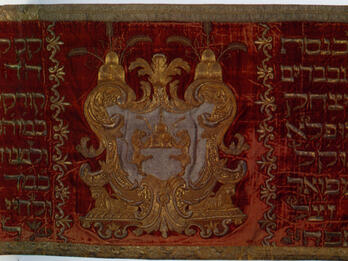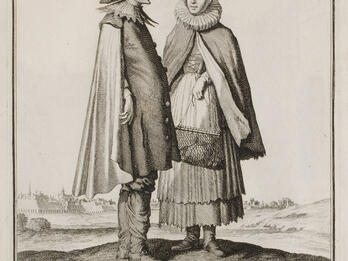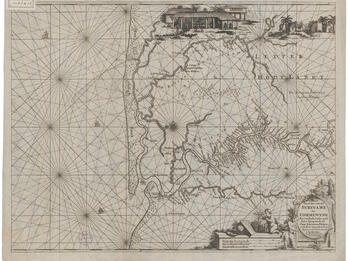Me‘il tsedakah (Robe of Righteousness)
Regarding that which is written: a man’s gift [makes room for him] (Proverbs 18:16), this means that the gift itself, which one personally gives to the poor, will make room for him. When you provide benefit to them, you are benefiting yourself. What is more, you are giving from what belongs to the blessed Lord, for you and that which belongs to you are His [see m. Avot 3:7]. All you possess is the ability to give it, not the money itself. Accordingly, a Jew who gives charity is actually not called a “giver” but a “taker” and a “recipient,” since he gives a coin and earns several coins. It is for this reason that the verse states and they should take for Me an offering (Exodus 25:2), rather than “and they should give Me an offering,” to teach that on the contrary, the giver is the one who takes and receives.
The double expression in the verse: the Lord is your keeper; the Lord is your shade upon your right hand (Psalms 121:5) is interpreted in a similar vein. After it has stated the Lord is your keeper, why does it reiterate the Lord is your shade? This comes to teach that the blessed Lord is like a shade, as a shade will copy that which a person does: if someone closes his hand, the shade will close its hand, and if a person opens his hand, the shade will likewise open its hand. The same is true of the blessed Lord—He will act toward a person in accordance with that individual’s deeds. This is the meaning of the emphases: you shall surely open your hand (Deuteronomy 15:8); you shall surely give him (Deuteronomy 15:10)—if he gives, the Holy One will also give. We can explain the following verse in a similar manner: that your brother may live with you (Leviticus 25:36), i.e., the blessed Lord has placed the life and sustenance of your brother the pauper with you, and you are merely like a custodian. Likewise, the verse if you lend money to any of My people, to the poor with you (Exodus 22:24) can be interpreted along these lines.
The author states: I am surprised at wealthy homeowners, as the Holy One has appointed them custodians over the poor, in such a manner that the money is not theirs, and yet they spend it freely as they wish, and when they give a penny to a pauper it is as hard to them as death. They do not pause to reflect that all the money they spend is from the deposited funds of the poor. Now, when the person with whom something has been deposited is found to be untrustworthy, the owner of the deposit—in this case, the blessed Lord—will remove the deposit from his possession and the situation will be reversed. This is why the Torah states: you shall surely give him and your heart shall not be grieved when you give to him; as on account of this matter the Lord your God will bless you in all your work and in all your endeavors (Deuteronomy 15:10). In other words, you shall surely give him doubly and on multiple occasions and your heart shall not be grieved when you give to him because on account of this matter He will bless you—when you give him double, the Holy One will leave the money in your possession and you may engage in business with it, and He will bless you in all your work and in all your endeavors. You will have many expenses for your own needs, and this is the meaning of and in all your endeavors—i.e., He will bless you in any endeavor you choose for your own expenses. Since you gave to the poor, all your endeavors that cost you money for your own needs shall be given to you as a gift.
The Luḥot ha-brit [Tablets of the Covenant, by Isaiah Horowitz] writes as follows:
Regarding those people, who, when they suffer some financial loss, or if they incur additional expenses, such as taxes, levies and the like, and are subsequently stingy in giving charity, this is like someone who tries to extinguish a fire with straw: the fire goes out momentarily, but then it becomes merely enflamed all the more. This is also comparable to a thirsty person who quenches his thirst with salty water—he is satisfied for an instant, but he soon becomes much thirstier. Instead, this person should examine his deeds—perhaps he committed a sin with some money, which he should return to its rightful owner, or maybe he refrained from giving charity on one occasion, and therefore he should give even more.
It seems that this is what the sages were referring to when they said: “if someone sees that his sustenance is limited, he should use it for charity” [b. Gittin 7a]. For he is certainly suffering from this limitation due to his failure to perform charity properly. Since he withheld his money on earth below, the funds are also withheld from him in heaven above, similar to the metaphor of the shade that I mentioned earlier. The commentaries of blessed memory wrote as follows on the verses, I have been young, and now am old, yet have I not seen the righteous forsaken, nor his seed begging bread. All day long he deals graciously and lends (Psalms 37:25). The speaker is effectively saying, “I have never seen the righteous forsaken or his seed begging bread as a result of his diligence and persistence in the commandment of charity and acts of lovingkindness, simply because he spends the whole day dealing graciously and lending.” Heaven forfend that we should believe that charity causes poverty, or that if someone observes an increase in his expenses, or a shrinking of his livelihood, that he should become miserly on this account and stop giving charity. On the contrary, if one sees that his sustenance is limited, he should use it for charity.
Credits
Elijah ha-Kohen ha-Itmari, “Me‘il tsedakah (Robe of Righteousness)” (manuscript, Izmir, ca. 1700; first published 1731). Republished as: Elijah (ben Solomon Abraham) ha-Kohen ha-Itmari, Sefer meʻil tsedakah (Lvov: F. Galinski und S.L. Flecker, 1859), p. 15a.
Published in: The Posen Library of Jewish Culture and Civilization, vol. 5.





